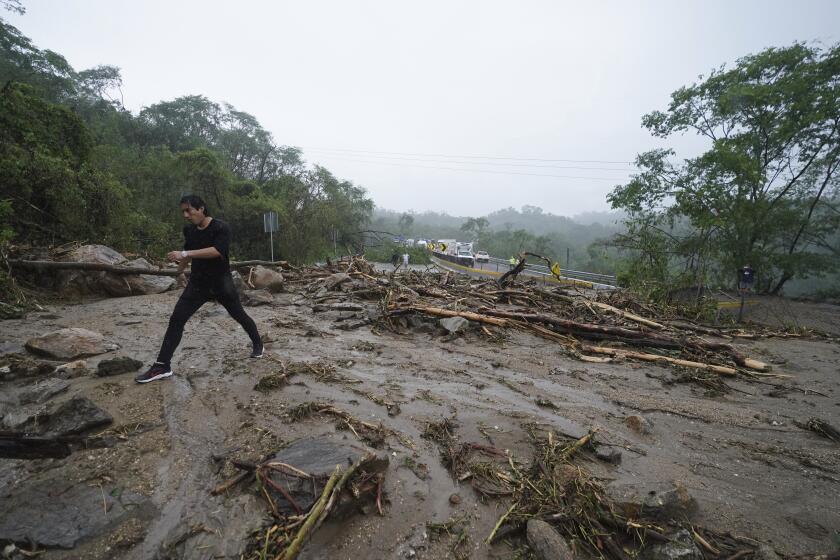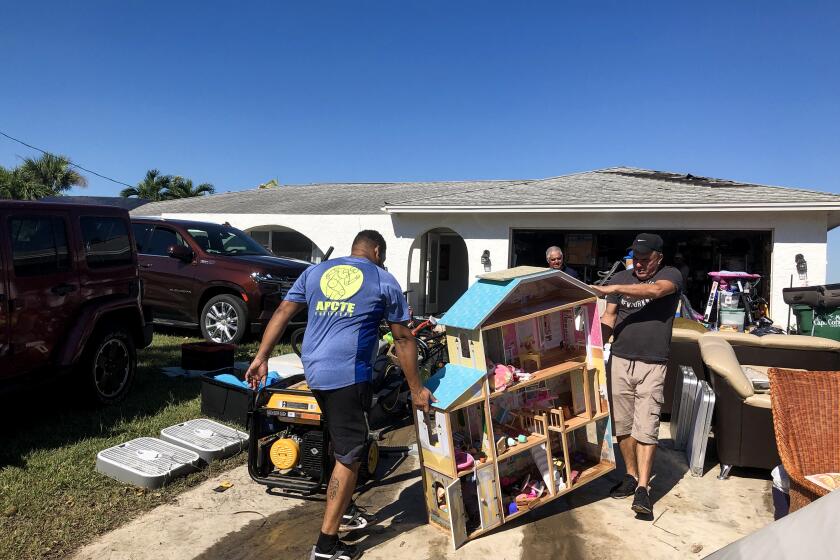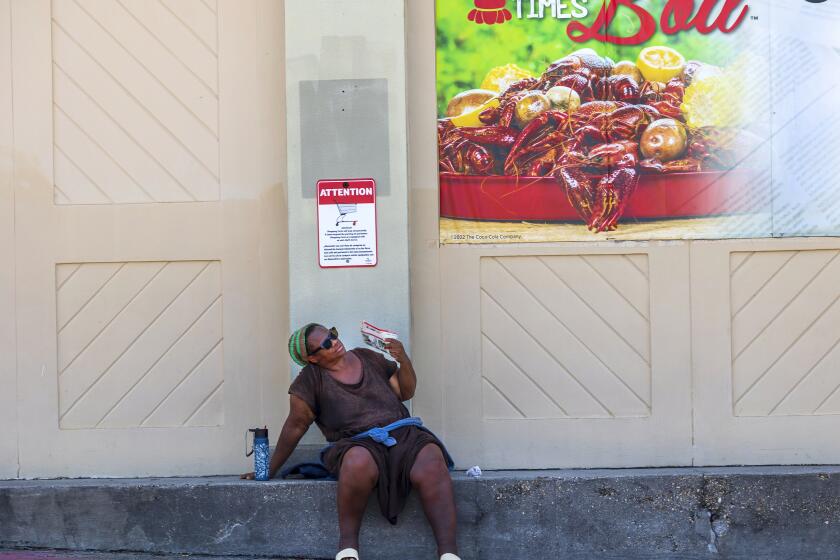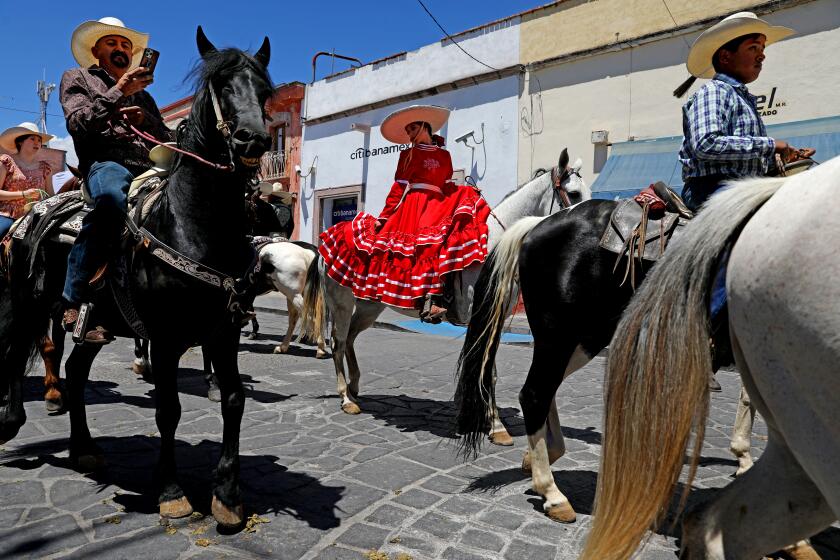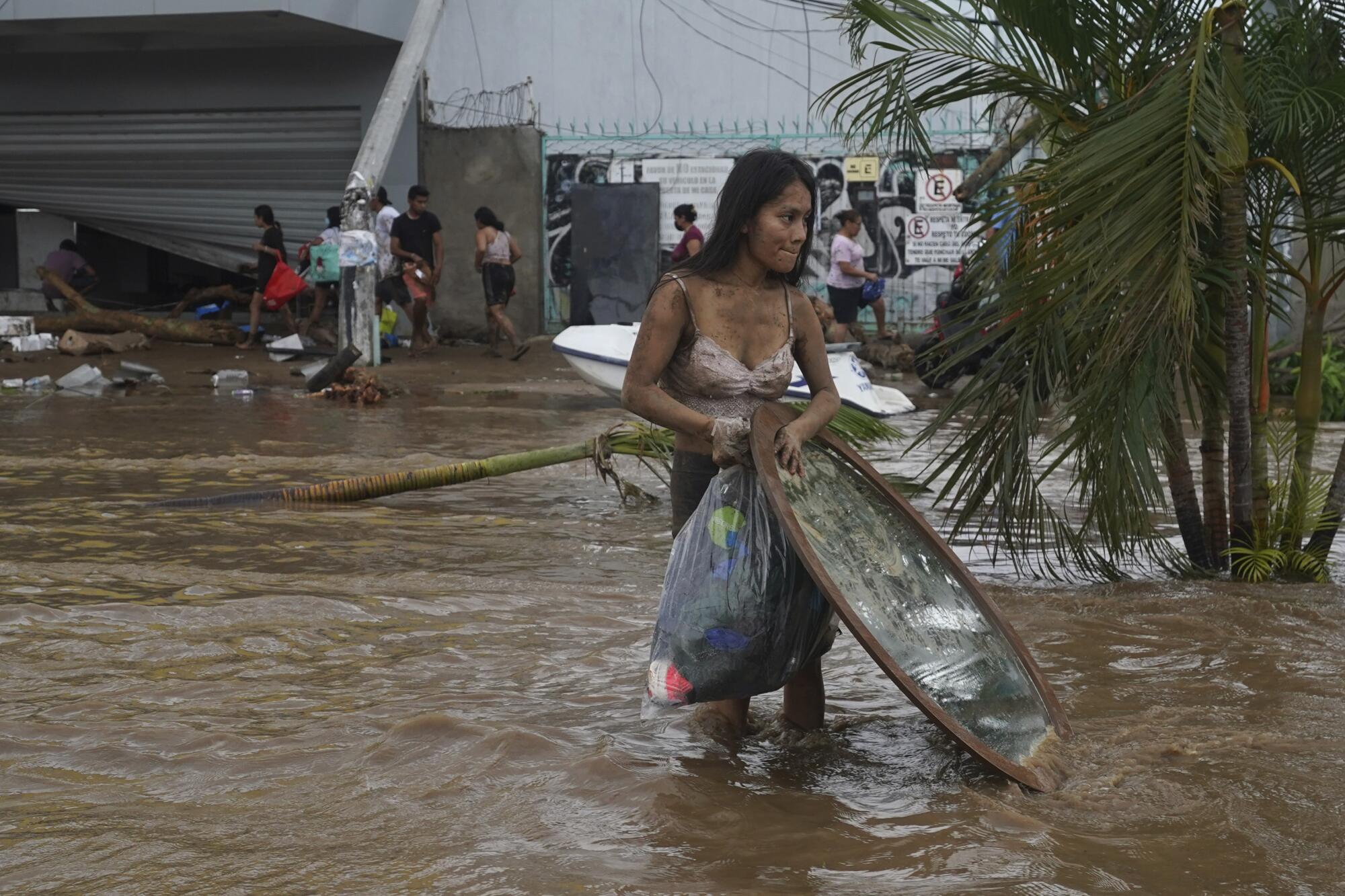
- Share via
ACAPULCO, Mexico — At least 27 people were killed and others remained missing a day after Mexico’s strongest hurricane in memory slammed into the resort city of Acapulco, ravaging homes, hotels and hospitals and submerging entire neighborhoods in debris-strewn floodwaters.
Hurricane Otis made landfall as a Category 5 storm early Wednesday morning, lashing this city of nearly 1 million with 165-mph winds.
The fast-moving storm weakened as it headed inland but left a trail of devastation, with roofs and facades ripped from shopping centers and roads blocked by mangled metal, uprooted trees and boats tossed from the sea.
State officials said 80% of the city’s hotels suffered damage. Many worried that the city’s poorest communities, where many live in shacks constructed of cinder block and tin, may have fared much worse.
Authorities said they had been forced to evacuate 200 patients from a damaged hospital and said the city’s hard-hit airport would remain closed until further notice.
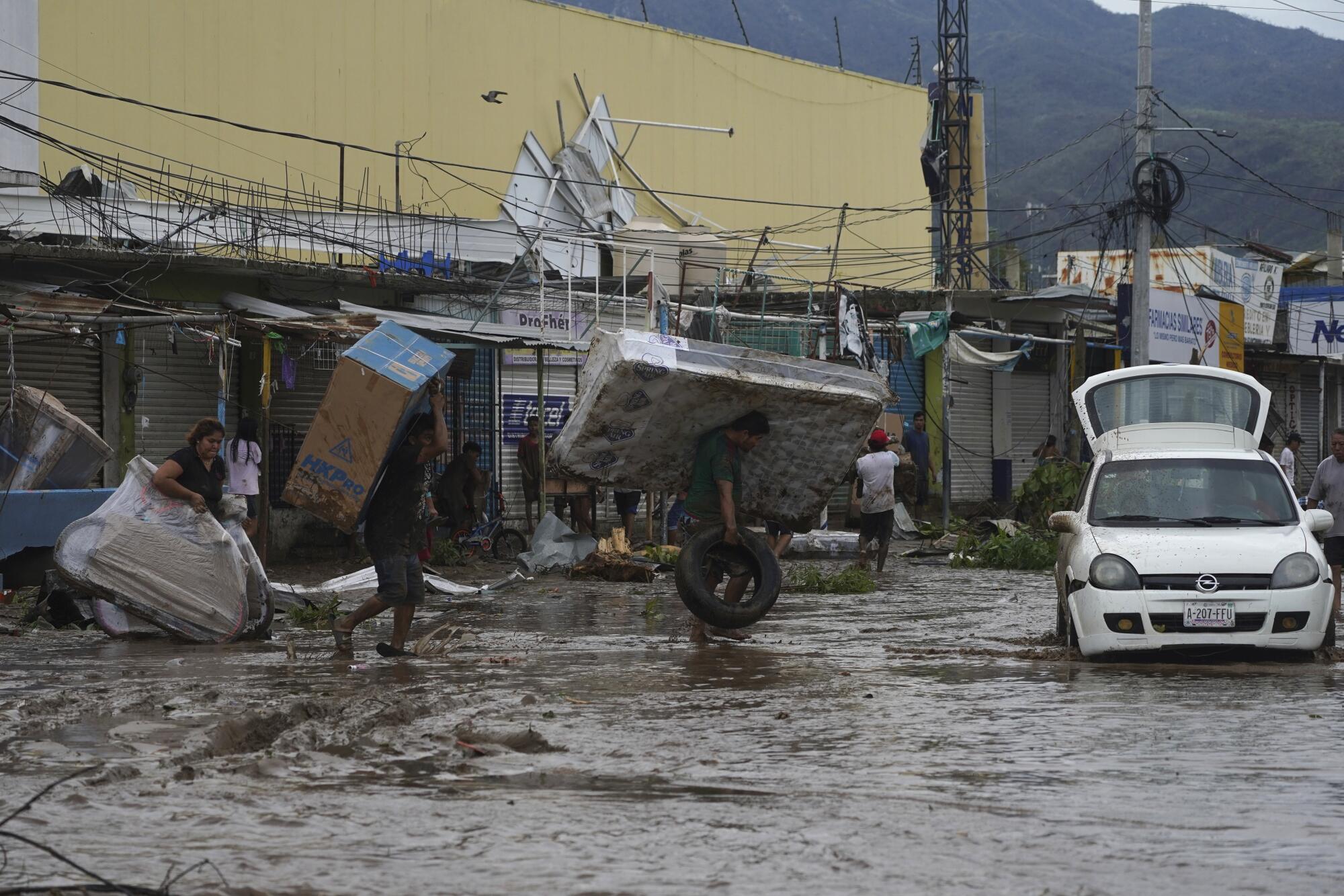
On Thursday, the clouds had cleared and the sun had emerged, but survivors were growing increasingly panicked, with many leaving severely damaged homes to seek food and water and desperately search for missing loved ones.
Efrén Garcia, a 61-year-old from the working-class beachside community of Barra Vieja, had traveled miles to seek food from a shopping center in the upscale Punta Diamante neighborhood.
Hurricane Otis slammed into Mexico’s southern Pacific coast as a catastrophic Category 5 storm, bringing 165 mph winds and heavy rain to Acapulco and nearby towns.
The storm, Garcia said, had been “two hours of hell.”
“It was the most terrible thing I ever lived through,” he said. “It was two hours of fear and panic. Everything was flying. I saw entire trees flying, and the tin roofs of houses flying off.”
“It was a nightmare,” Garcia said. “I give thanks to God that I’m alive.”
On a nearby highway overpass, he and dozens of other people had gathered, lifting their phones in the air in a frantic attempt to get a cell signal.
Should Cape Coral and other low-lying cities in Florida rebuild in an era of more intense hurricanes, higher rainfall and rising seas?
Half a million residents lost electricity during the storm, and on Thursday afternoon, more than 200,000 people remained without power. Most cellphones were not working.
Nancy Olivares, 37, was anxious for word from her truck-driver husband, who had been working a route between Acapulco and the nearby city of Chilpancingo when the hurricane struck.
“I hope to God he’s OK,” said Olivares, a mother of two.
She said the storm had ripped the roof of her home.
“The hurricane left us with nothing,” she said. “We don’t even have a place to sleep. My house is full of mud.”
“It was very destroyed,” Mexican President Andrés Manuel López Obrador said of Acapulco on Thursday. “There’s no precedent for this in recent times.”
López Obrador managed to visit the city late Wednesday after crews opened the highway connecting Acapulco to Mexico City, which had been closed for most of the day by a mudslide.
Floods, fires, extreme heat, awful air quality, warming seas: As extreme weather engulfs the nation, the United States resembles a disaster movie set.
The president said emergency crews were heading to the city to assist residents, restore power and survey the damage. Still, many here seemed frustrated by what they viewed as a slow response.
Jesus Arturo Bernal, who had taken a case of Coca-Cola from a store in Punta Diamante, wept as he considered his circumstances.
“Really the government has done nothing for us,” said Bernal, 56. “So we have no choice but to do this.”
A taxi driver by trade, Bernal said his vehicle had been completely destroyed by the storm: windows broken, filled with mud and smacked by falling debris.
Many of the vehicles lined up to leave town on Thursday afternoon resembled his.
As crime engulfs many Mexican states, immigrants who’ve saved to retire there are reevaluating ties to home — and whether returning is worth the risk.
There is no question that intensity of the storm took the government and many residents by surprise.
Just 24 hours before it struck, meteorologists were predicting Otis would make landfall as a relatively light Category 1 hurricane.
But after hitting a patch of warm ocean water, it quickly picked up power, becoming one of the fastest-growing hurricanes ever observed. Many climate experts agree that El Niño and human-driven climate change are probably both to blame.
Just hours before the storm hit, the National Hurricane Center warned of a “potentially catastrophic Category 5 hurricane.” The center said a “nightmare scenario” loomed as the storm bore down on a city whose residents had been given little time to prepare.
Fisherman Fernando Roque, 40, said he survived the hurricane by cradling his wife and two daughters. The small community where he lives, Barra Vieja, is directly on the coastline, a community of modest homes and thatched roof seafood restaurants.
“We all went into bed together — me, my wife and the girls. They were crying with fear. The roof was made of tin and it was roaring like a train,” Roque said. “I held my girls in my arms and I wondered what would happen to them if I died.”
Erik Fellini, a 26-year-old magician from Mexico City, didn’t realize that he and his family were about to face a ferocious hurricane.
Fellini, his wife, their two toddlers, his parents, his brother and his brother’s wife got to the resort city on Monday for a four-day vacation. They spent Tuesday on the beach despite the clouds and light rain. At about 10:30 p.m., he turned on the television, his children asleep, and saw that a Category 5 hurricane would soon make landfall.
Around the same time, hotel staffers stuck a paper on their room’s door handle announcing that guests would be losing access to the beach. It didn’t mention a lethal hurricane was coming or where to seek shelter, he said.
“The hotel had been functioning normally, so we hadn’t been worried,” he said. “We never imagined this and we hadn’t seen the news.”
At the lobby, a hotel worker said that guests had to stay in their rooms. Shelter how you can, a receptionist told the family.
On the hotel’s eighth floor, they gathered in one of their rooms and piled up mattresses and a desk near the windows. They began to hear glass shatter. Water dripped into the room from the air vents — soon reaching their ankles — and as the wind howled, Fellini worried about his toddlers’ eardrums.
“It felt like it was an earthquake,” he said. “But in an earthquake it’s a minute and it finishes, and here it was 30 minutes of the hotel moving from one side to another.”
He ultimately made his way down the stairwell to the lobby to see if there was a safer place to shelter, jumping over rubble.
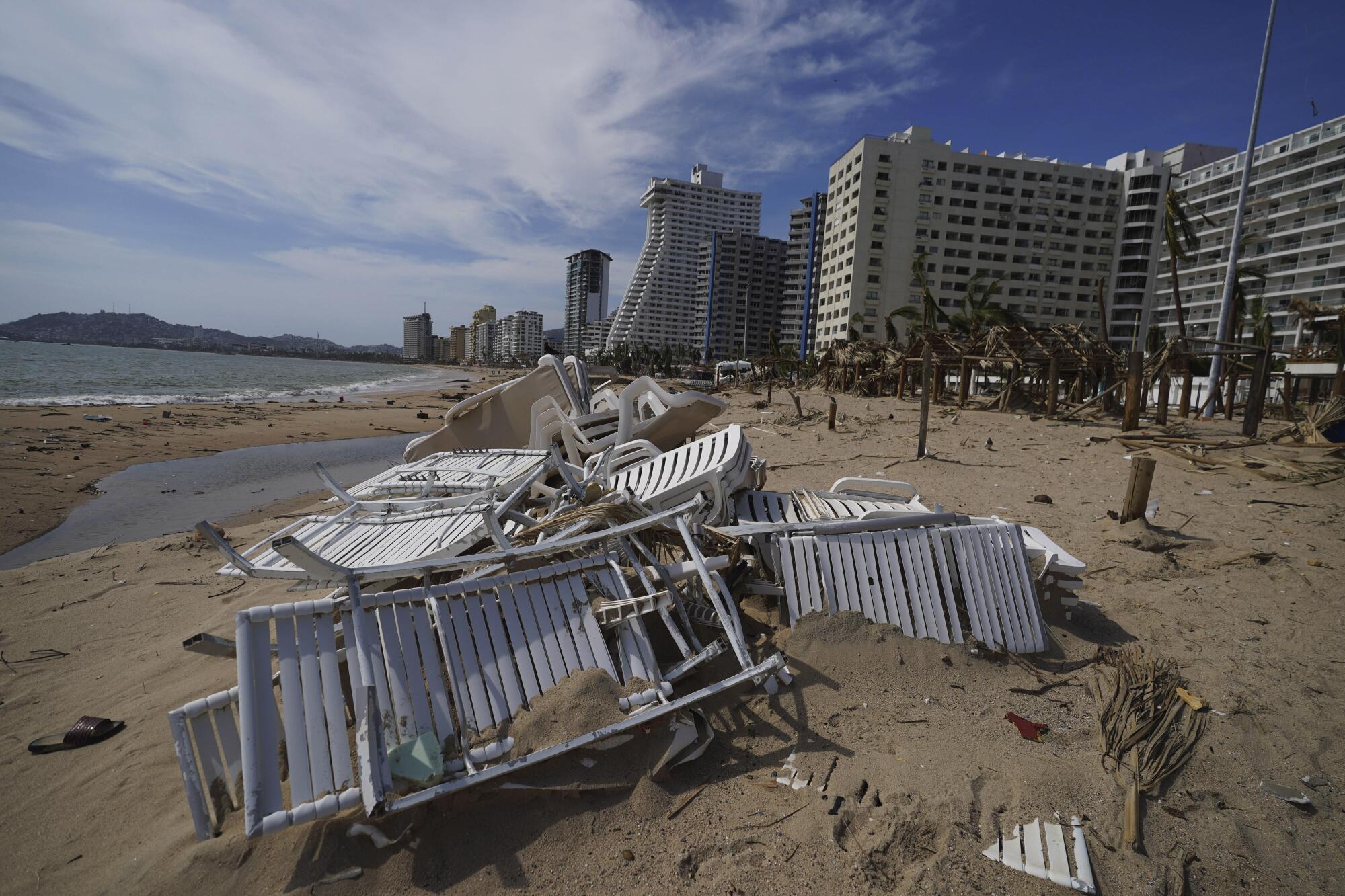
“The scene is like in the Titanic, you see everything destroyed, the water up to our calves,” he said.
The family joined dozens of other guests in a large salon, where they were given towels to dry themselves. People slept on the floor, exhausted from stress. Fellini and his brother helped elderly people in wheelchairs come down from their hotel rooms. Several had been injured by broken glass.
In the morning, the family decided to leave — their car was undamaged — and drove 14 hours back to Mexico City, traveling through winding mountain roads.
“The truth is that Acapulco is devastated,” said Fellini. “We’re thankful that God let us get out.”
Times staffers Kate Linthicum and Leila Miller reported from Mexico City and staffer Patrick J. McDonnell reported from Acapulco. Also contributing was special correspondent Cecilia Sanchez Vidal in Acapulco.
More to Read
Sign up for Essential California
The most important California stories and recommendations in your inbox every morning.
You may occasionally receive promotional content from the Los Angeles Times.
